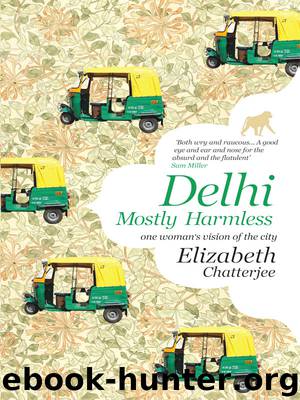Delhi by Elizabeth Chatterjee

Author:Elizabeth Chatterjee
Language: eng
Format: epub
ISBN: 9788184005103
Publisher: RANDOM HOUSE PUBLISHERS INDIA PRIVATE LIMITED
It is not only the traveller and the Holi warrior who tremble in Delhi: the whole city is on edge every day of the year. Middle-class Dilliwallas, especially (and unsurprisingly) women, speak as though they are under siege.
‘Of course, you won’t go out after 6 pm,’ my recently discovered relatives nodded, ‘seeing how it’s such a dangerous city.’ They hadn’t ventured north to Old Delhi for years, or ever visited my southwestern area, half an hour away on the outer ring road. Another older friend hadn’t even braved the metro. Each day they go to the same shops, do the same daily commute, keep their eyes averted from the rest of the city, and exchange rumours: ‘Someone got shot at those lights. She was just sitting in her car, stopped at the lights. They drove next to her and shot her in the head. The police have not caught them. Blood everywhere at the lights. The police will never catch them.’
But what are the middle classes—and here I must include myself, with my gated life—afraid of? In its choice of bogeymen, Delhi is a dedicated follower of global fashion.
Terrorism is a consistent fear, though it isn’t greeted with quite the same hysteria as in Boston or Bradford. The Global Terrorism Index claims India has witnessed the third-highest number of terrorist incidents of any country in the decade since 9/11, after only Iraq and Pakistan. Delhi has been attacked several times, and is periodically prone to spates of hoaxes and panics. As in America, the terrorist is seen as a bearded, goggly-eyed Muslim madman. Islamists with links to Pakistan claimed responsibility for bomb blasts in 2005 and 2011, and for December 2011’s dramatic attack on the Indian Parliament.
The difference is that India has possibly the second-largest Muslim population in the world—possibly. WikiLeaks revealed that the US government thinks India has underestimated the number. The 2001 census put the figure at 138 million. As I write, the ever election-minded government has held off releasing data from the 2011 census, but the Pew Research Center gave an estimate of 176 million (14.4 percent) in 2010. Delhi itself had a distinctly Muslim flavour until Partition, from seven centuries of uneven Muslim rule and habitation. Islamophobia is a lot more dangerous in such a context: the country has also seen ‘saffron terror’ bombings, allegedly committed by Hindu fundamentalists.
The insurance market appears to think the risk is declining. Nonetheless, scanners, soldiers and security guards are ubiquitous, especially in locations frequented by tourists and the middle classes, like the entry to malls, monuments, the metro, and big hotels. You might think there is nothing less reassuring in the metro than the sight of an archaic-looking rifle sticking out of a sandbag emplacement, but for the lonely fieldworker the security caress is a rare and overstimulating moment of intimacy. Sometimes I went in and out of the metro just for the human warmth.
But the procedures are slow and awkward and unaccountable too. Dilliwallas are pumped with enough X-rays to cut the subcontinent’s fertility rate.
Download
This site does not store any files on its server. We only index and link to content provided by other sites. Please contact the content providers to delete copyright contents if any and email us, we'll remove relevant links or contents immediately.
Niceville by Carsten Stroud(2576)
Tokyo by Rob Goss(2014)
Lonely Planet's Guide to Travel Photography by Lonely Planet(1565)
Letter to My Daughter by Maya Angelou(1452)
Arctic Dreams by Barry Lopez(1410)
Ceremony In Death by J D Robb(1238)
Tolkien, J. R. R. - The Fellowship of the Ring by Tolkien J. R. R(1180)
The Source by James A. Michener(1128)
The Lord of the Rings: The Fellowship of the Ring, the Two Towers, the Return of the King by J. R. R. Tolkien(1079)
Nothing to Envy by Barbara Demick(1039)
The Elements of Eloquence by Mark Forsyth(1015)
Epic Hikes of the World by Lonely Planet(1000)
The Price of Salt, or Carol by Patricia Highsmith(967)
African Nights by Kuki Gallmann(964)
The Cities by K.A Knight(912)
Trieste and the Meaning of Nowhere by Jan Morris(833)
The Safe Word by Karen Long(814)
Lonely Planet Epic Drives of the World by Lonely Planet(808)
The Fellowship of the Ring (The Lord of the Rings, Book 1) by J. R. R. Tolkien(800)
